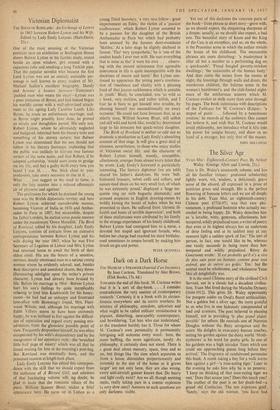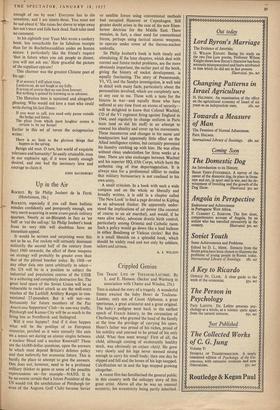The Silver Age
THis is Dr. Waley's nineteenth volume, and has all his familiar virtues : profound scholarship lightly wOrn, wit, wisdom, a deliciously grave sense of the absurd, all expressed in a prose of patrician grace and strength. His is the perfect. flowering of humane letters and we are all deeply in his debt. Yuan Mei, an eighteenth-century Chinese poet (1716-97), was that rare phe- nomenon, a professed hedonist who actually suc- ceeded in being happy. Dr. Waley describes him as 'a lovable, witty, generous, affectionate, hot- tempered, wildly prejudiced man; a writer of poetry that even at its highest always has an undertone of deep feeling and at its saddest may at any moment light a sudden spark of fun.' The sort of person, in fact, one would like to be, whereas one rarely succeeds In being more than hot- tempered and wildly prejudiced. Remy de Gourmont wrote : '11 est probable qu'il n'y a rien de plus sain pour on homme, comme pour tout animal, que de suivre ses goats.' Yes : but the animal must be wholesome, and wholesome Yuan Mei all delightfully was.
It is the usual Chinese story of the civilised Civil Servant, not in a classic but a decadent civilisa- tion. Yuan Mei lived during the Manchu Dynasty (1644-1912). This gives Dr. Waley opportunity for pungent asides on Ovid's fluent artificialities. Not a golden but a silver age; the more grateful to us who live in one hideously compounded of lead and uranium. The poet believed in pleasing himself, not in providing 'le plus grand plaisir possible' for others. He reminds one of Norman Douglas without the flinty arrogance and the scorn. He delights in evocatory human touches, setting his garden against the dusty world. 'Moth- eyebrows' is his word for pretty girls. In one of his gardens was a high mirador 'from which one could see approaching guests long before they arrived.' The fragrance of sandalwood permeates this book. A monk taking a boy for a walk warns him against a girl—`a man-eating tiger.' Later in the evening he asks him why he is so pensive: 'I keep on thinking of that man-eating tiger we met.' Does that amuse you? Does this touch you? The mother of the poet is on her death-bed—a grand old Confucian. The son expresses grief. 'Surely,' says the old woman, 'you have had. enough of me by now ! Everyone has to die sometime, and I am ninety-three. You must not be sad about it.' She raises her sleeve to wipe away her son's tears and falls back dead. Such tales need no comment.
In his eightieth year Yuan Mei wrote a cookery book, less remarkable for its fabulous receipts than for its Rochefoucauldian asides on human nature. I particularly like the friend's request 'that in future when you ask people to dinner, you will not ask me.' How graceful the picture of the suppliant epicure!
This charmer was the greatest Chinese poet of his age:
If at seventy I still plant trees,
Lookers-on, do not laugh at my folly.
It is true of course that no one lives forever; But nothing is gained by knowing so in advance.
The Horatian tone is sustained and altogether pleasing. Who would not love a man who could write during his last illness :
If you want to call, you need only pause outside the hedge and listen;
The place from which most laughter comes is certain to be my house!
Earlier in this set of verses the octogenarian writes : There is no limit to the glorious things that happen in the spring.
Benign old man. 0 rare, lost world of exquisite tolerance and humanity ! So easily attainable, even in our explosive age, if it were keenly enough desired, and one had the necessary love and



































 Previous page
Previous page